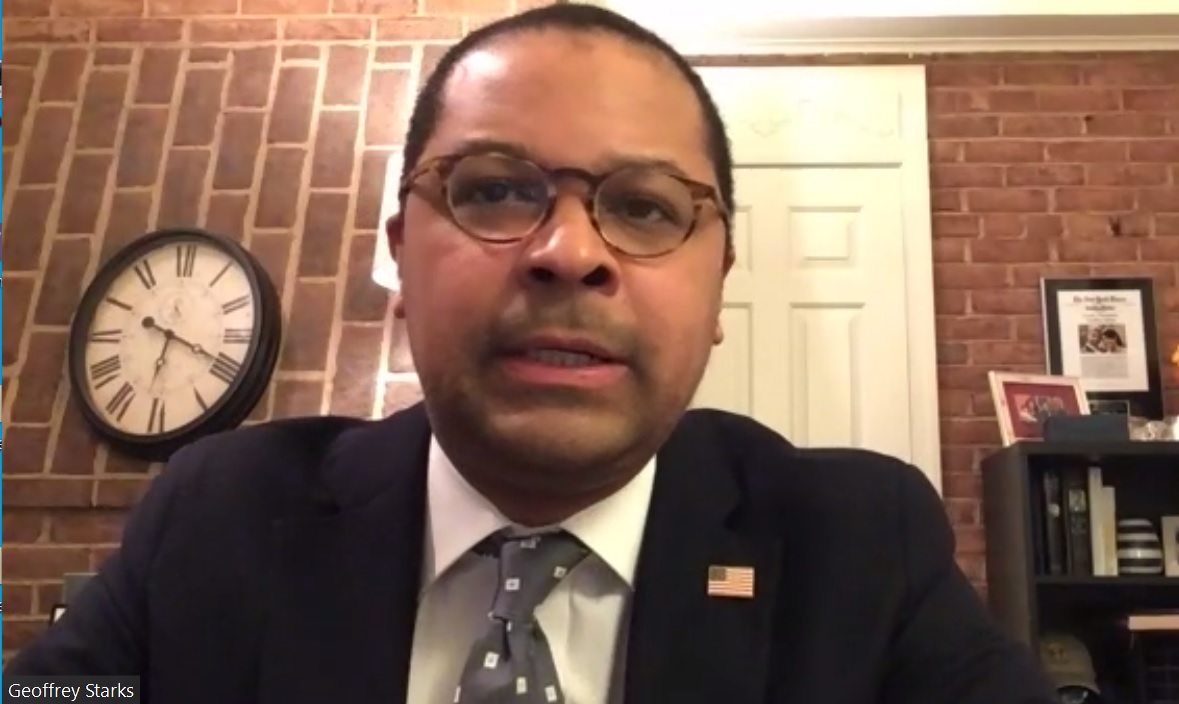FCC's Geoffrey Starks: Digital Disparities Must Not Stand
Provides his take on how emergency broadband funding should be handed out

The smarter way to stay on top of the streaming and OTT industry. Sign up below.
You are now subscribed
Your newsletter sign-up was successful
FCC Commissioner Geoffrey Starks said that the digital divide has morphed during COVID-19 to a monstrous divide that leaves people of color disproportionately on the wrong side. "This cannot stand," he said, adding that the country can no longer put off the hard work of digital equity. "This is the time. This is the moment."
He also called that disparity the "smoldering front" in the battle against internet inequality.
Commissioner Starks was speaking Tuesday (Jan. 26) at the State of the Net conference, the 17th annual but the first virtual.
Also Read: NCTA Says Broadband Pledgers Should Automatically Qualify for EBB
He called the COVID-19 era both an unprecedented crisis and an unparalleled opportunity, starting with getting the billions in COVID-19 related Emergency Broadband Benefit (EBB) aid to as many Americans as possible.
The FCC has only 60 days to stand up at $3.2 billion emergency broadband benefit for low-income Americans. The FCC is empowered to offer up to $50 per household per month for broadband connectivity ($75 per month on tribal lands), and up to $100 to subsidize access devices for those households that also contribute to the cost.
The FCC has gotten a lot of industry comment on the program this week--the deadline was Jan. 25--and Starks had his own, saying it should focus on two priorities (Starks is now speaking to an acting Democratic chair, Jessica Rosenworcel, and eventually a 3-2 Democratic majority, so his party will have the power to make those changes):
The smarter way to stay on top of the streaming and OTT industry. Sign up below.
1. He said the FCC should do broad outreach that includes state and local governments, ISPs, philanthropies and others, pointing out that the current FCC Lifeline low-income subsidy--through which the emergency funding is being handed out--is only tapped into by 20% of eligible subscribers.
2. Starks said the FCC should make the rules as clear and simple as possible to encourage ISPs' voluntary participation. He said he has already started reaching out to ISPs and their associations to encourage participation.
But Starks also said he recognized that while the EBB, if successful, could reach more disconnected people of color than any previous FCC effort, it was a short-term solution to a long-term problem.
Also Read: Verizon Proposes Government-Funded Broadband Debit Cards
He said the FCC has focused almost exclusively on the rural broadband divide while three times as many unconnected households are in urban areas. For example, he said, almost half the residents of Detroit lack access to broadband.
To address that long-term issue, he said the FCC should update its Lifeline subsidy by entering into memoranda of understanding (MOU) with other federal agencies that when they administer programs with similar criteria to low-income broadband eligibility, they be told about the Lifeline subsidy. If someone is enrolled in SNAP (the Supplemental Nutrition Assistance Program), they are probably broadband insecure as well.
He also said the FCC needs to complete its study of the Lifeline program and update the E-rate schools and libraries subsidy to make it clear that it can be used for remote education from home. The FCC under former chairman Ajit Pai interpreted the "classroom" language in the E-rate statute to preclude subsidizing home broadband or equipment, even in the pandemic when the home has morphed into the classroom. Starks called that a cramped reading.
Contributing editor John Eggerton has been an editor and/or writer on media regulation, legislation and policy for over four decades, including covering the FCC, FTC, Congress, the major media trade associations, and the federal courts. In addition to Multichannel News and Broadcasting + Cable, his work has appeared in Radio World, TV Technology, TV Fax, This Week in Consumer Electronics, Variety and the Encyclopedia Britannica.

